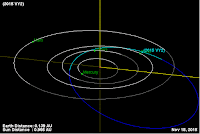Asteroid
2015 VV2 passed by the Earth at a distance of 6 623 000 km (17.2
times the average distance between the Earth and the Moon, or 4.43% of
the average distance between the Earth and the Sun), slightly after
10.30
pm on Wednesday 18 November 2015. There was no danger of the asteroid
hitting us, though had it done so it would have presented only a minor
threat. 2015 VV2 has an estimated equivalent diameter of 19-59 m (i.e.
it is estimated that a spherical object with the same volume would be 19-59 m in diameter), and an object of this size would be expected to
explode in an airburst (an explosion caused by superheating from
friction with the Earth's atmosphere, which is greater than that caused
by simply falling, due to the orbital momentum of the asteroid) in the
atmosphere between 22 and 8 km above the ground, with only fragmentary
material reaching the Earth's surface.
2015 VV2 was discovered on 6 November 2015 (twelve days before its closest approach to the Earth) by the University of Hawaii's PANSTARRS telescope on Mount Haleakala on Maui. The designation 2015 VV2 implies that it was the 71st asteroid (asteroid V2) discovered in the first half of Novembrr 2015 (period 2015 V).
2015 VV2 has an 753 day orbital period and an eccentric orbit tilted at an angle of 6.35° to the plane of the Solar System that takes it from 1.01 AU from the Sun (i.e. 101 % of the average distance at which the Earth orbits the Sun) to 2.23 AU from the Sun (i.e. 223% of the average distance at which the Earth orbits the Sun, considerably over twice the distance at which the planet Mars orbits). It is therefore classed as an Amor Group Asteroid (an asteroid which comes close to the Earth, but which is always outside the Earth's orbit). This means that close encounters between the asteroid and Earth are fairly common, with the last thought to have happened in October 2013 and the next predicted in January 2018.
See also...
 Asteroid 2015 VD105 passes the Earth. Asteroid
2015 VD105 passed by the Earth at a distance of 2 777 000 km (7.22
times the average distance between the Earth and the Moon, or 1.86% of
the average distance between the Earth and the Sun), slightly before 4.25
pm on Monday 16 November...
Asteroid 2015 VD105 passes the Earth. Asteroid
2015 VD105 passed by the Earth at a distance of 2 777 000 km (7.22
times the average distance between the Earth and the Moon, or 1.86% of
the average distance between the Earth and the Sun), slightly before 4.25
pm on Monday 16 November... Asteroid 2015 VU65 passes the Earth. Asteroid
2015 VU65 passed by the Earth at a distance of 2 009 000 km (5.23
times the average distance between the Earth and the Moon, or 1.34% of
the average distance between the Earth and the Sun), slightly before
10.05
pm on Saturday 14...
Asteroid 2015 VU65 passes the Earth. Asteroid
2015 VU65 passed by the Earth at a distance of 2 009 000 km (5.23
times the average distance between the Earth and the Moon, or 1.34% of
the average distance between the Earth and the Sun), slightly before
10.05
pm on Saturday 14... Asteroid 2015 VY2 passes the Earth. Asteroid
2015 VY2 passed by the Earth at a distance of 18 550 000 km (48.6 times
the average distance between the Earth and the Moon, or 12.4% of the
average distance between the Earth and the Sun), slightly after 10.00 pm
GMT on Wednesday 11...
Asteroid 2015 VY2 passes the Earth. Asteroid
2015 VY2 passed by the Earth at a distance of 18 550 000 km (48.6 times
the average distance between the Earth and the Moon, or 12.4% of the
average distance between the Earth and the Sun), slightly after 10.00 pm
GMT on Wednesday 11...Follow Sciency Thoughts on Facebook.

